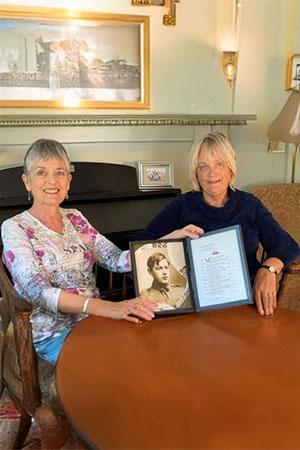
Richard Maddigan was a teenage boy from Newfoundland when he stood for hours before dawn in a dark, crammed trench in northern France the morning of 1 July 1916.
Less than 500 metres away, the Germans lay in wait.
It was the first day of the Battle of the Somme, and the Newfoundland Regiment led the third wave of an ill-fated attempt to gain control of the German trenches.
Maddigan was one of hundreds of soldiers killed at Beaumont-Hamel as they ran down a grassy slope into enemy fire. Within minutes, the Newfoundland Regiment was almost completely wiped out.
“I wanted to get into the real story.”
Almost a hundred years later, his great-nieces travelled to the French countryside to visit his grave and stood in the same trench, overwhelmed with emotion for the heavy loss and brave sacrifice Newfoundland – and their family – made that day.
In 2015, with the 100th anniversary of the battle of Beaumont-Hamel about a year away, Flanagan and Grant booked a Bed and Breakfast and planned their pilgrimage.
“It was so emotional, we were both crying,” Joan Grant explains.
“It was surreal, 100 years later.”
Grant and her sister Eileen Flanagan had grown up hearing their grandmother speak of the brother she lost in the war. They knew how upset she was when she spoke of Richard, but they were children and didn’t inquire further.
Decades later, Grant ordered his service records and the sisters began to piece together an important part of their family history, one that would lead them back in time.
“I wanted to get into the real story,” Grant says.
As information trickled in they started to get a clearer impression of who Maddigan was. When they saw a photograph of his handsome young face they instantly recognized him as kin.
“It was so exciting because Richard could have been an identical twin to our own brother. The family connection was so real then -- this is our family,” she says.
Flanagan, a retired school teacher, remembers learning about the First World War in school but not really feeling an emotional connection. Everything changed for her when it got personal.
“When we learn it in school we don’t really connect it to people we knew,” she explains.
“Now that I have grandchildren of my own who are the same age as he was when he went into battle, I think what that must have been like for someone like him growing up in Newfoundland – a young boy and heading to Europe and the Middle East and not even remotely knowing what he was getting into, and then being killed on the first day of the battle. It was pretty emotional.”
“Germany was defeated, he was part of that and what he went through – we should revere that.”
The small French village of Beaumont-Hamel on the River Somme has become a living monument to war: the tunnels, trenches and shell holes are still there, now filled with grass.
A tour guide took the sisters down in the trenches and explained how the soldiers stood there for hours and hours, armed and waiting to run down the hill into enemy fire. The soldiers’ etchings are still visible on the walls.
“To be down there and to realize what it’s like, then to come out of that hole and run across that field. They could point out to us where the Germans were within sight,” Flanagan says.
More than 700 members of the Newfoundland Regiment were killed or wounded at Beaumont-Hamel. As the tragic news trickled back home the local newspapers ran long casualty lists. Almost every family was impacted.
The trip to inspired the sisters to plan for a second trip to Newfoundland for the 100th.
Flanagan said the solemnity of the occasion in Newfoundland was a stark comparison to the joyful Canada Day celebrations she’d grown up with. They went to the monument in St. John’s and saw Princess Anne lay a wreath, attended an Opera written about the battle and the official opening of The Rooms Museum.
“It’s mainly the anniversary of the Battle of Beaumont-Hamel, it’s not Dominion Day. It’s very solemn, like our Remembrance Day here.”
Grant will always be grateful to her great-uncle for his sacrifice.
“He went across the ocean and was killed within a year - what he went through, Germany was defeated, he was part of that and what he went through, we should revere that.”
In honour of the 105th anniversary of the Battles of the Somme and Beaumont-Hamel, we're sharing the stories of Canadians who have a personal connection.